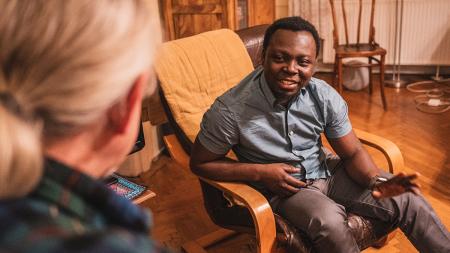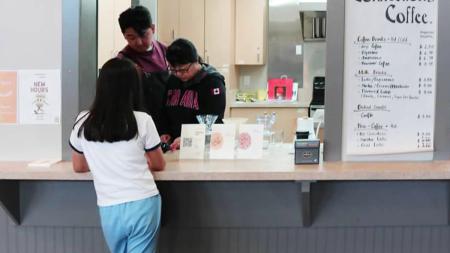Bringing Ministry to Nursing Homes

One Thursday morning in late June, Rev. Michael Vanden Berg, pastor of Hope Community Church in Lawrence, Ind., looked out at the people using wheelchairs and walkers and sitting on benches in the outdoor courtyard of a senior living center in Indianapolis, Ind.
Until now, the pastor and church members at this facility had not met for an in-person service for several months. But as the Indianapolis area started to ease up on COVID-19 restrictions, they received permission to meet.
About 20 people had gathered in the courtyard of the Wickshire Fort Harrison senior living center for the service. Wickshire is one of three senior homes where Hope Community Church, which calls itself a church without walls, conducts ministry.
“There were smiles all around as we got started,” said Vanden Berg, who preached that morning on 1 John 3:1-3, a passage reminding everyone of the “great love the Father has lavished on us.”
Over the past two months, CRCNA representatives have called churches across the denomination, including Hope Community CRC, to see how they are faring during the pandemic. The callers found that some churches are thriving, while others are struggling.
The report noted that Hope Community is “a unique congregation that consists of four groups — three in senior living centers and one in a YMCA. The pastor is doing sermons — one per week — and daily devotions, both online and in print for senior centers. They have seen an increase in people watching their online devotions and the service based at the YMCA.
The report added, “The pastor is seeing many people asking for prayer that wouldn’t otherwise do so, and many people are coming to God. He said that God is doing ‘a marvelous work right now.’”
Having served Reformed Church in America congregations in cities such as Flint, Mich., and Lafayette, Ind., Vanden Berg has often been called to play a role in helping to revitalize a congregation. He came to Hope Community 12 years ago to help the church weather a drop in membership and to address other concerns.
“I’ve learned that the only way for a church to survive is to adapt. You never compromise the gospel, but you never shut off new ways when they present themselves,” said Vanden Berg.
As the pastor of Hope Community Church, Vanden Berg serves as chaplain at the local Benjamin Harrison YMCA and at the nursing care or assisted living facilities and occasionally conducts ministry at an apartment building across the parking lot from the YMCA.
“We are not a typical CRC,” Vanden Berg said. “We are still very Reformed. We view covenantal theology as critical, but many of those we minister to are not CRC; they come from other denominations, and we don’t ask them to join the CRC.”
As the COVID-19 pandemic has battered some churches, and as other congregations have been able to survive and even expand their ministry by going online, Hope Community has so far gotten through the crisis, largely with the help of Vanden Berg and the church council. They split up the duties, making phone calls and sending cards to church members. They dropped off geranium plants on Mother’s Day and bags of fruit and candy to residents on Father’s Day.
Of the 129,000 deaths in the U.S. from COVID-19, more than 40 percent occur among nursing care facilities.
As best he knows, said Vanden Berg, no one in any of the homes where he serves has died from COVID-19. But being away from one another and sequestered in their rooms has taken a toll on people’s health and frame of mind, highlighting just how difficult it can be when these people are unable to hug and touch and speak to others in person.
Although many people can access the Sunday service and daily devotions, which are online, church members at the senior care facilities miss those opportunities because they generally don’t have internet access.
“We know, though, that some of the nurses will bring their iPads into a room and leave it there for the person to look at — and when they are done, the nurse will pass it to someone else,” said the pastor.
Hope Community CRC has been flexible and able to quickly respond to the needs of their congregants because as a church they have needed to reinvent themselves and become more aware of the needs of the people around them ever since they sold their church building a few years ago.
Not willing to close their congregation for good and hoping they could once again attract and build a new membership, they moved into a space at the Benjamin Harrison YMCA in Lawrence. They thought that in this way they might attract younger families who use the YMCA for its services.
But that hasn’t happened. Still, said Vanden Berg, the church has kept going by changing course and taking services and ministry into the nursing care facilities — a process of simply following God’s leading and responding to needs placed before them. And, as a result, they have become a “church without walls.”
“We probably only have a dozen or so actual members of our church, but there are at least 100 who worship with us,” given all of the locations, said Vanden Berg. “We minister to people in their 70s and 80s and 90s — and, in fact, many are in their 90s.”
No longer needing to maintain a sanctuary for weekly worship and to offer other ministries to churchgoers, said Vanden Berg, they have created a new kind of ministry — for seniors — and this gives the church a special flavor with a mixture of strengths and weaknesses during the pandemic.
“When your congregation is elderly like this, they can’t volunteer at the local food bank, but they can serve in the way they live their lives,” said Vanden Berg. They can also serve, he added, through prayer.
Besides Sunday worship at the YMCA, Hope Community CRC worships at Traditions at Brookside in McCordsville, Ind., on Tuesdays and at Elmcroft of Fort Harrison and at Wickshire Fort Harrison on Thursdays.
Community CRC began to emphasize worship for seniors when residents of the apartment building next to the YMCA started to come for the Sunday service and then, said Vanden Berg, these people opened up the ministry to visit the senior facilities when some of them began to move into those homes.
“We are ministering to some of the most neglected people in our communities. Many do not have family members nearby. We realized when we began to visit the homes that this is a wide-open field for ministry,” said Vanden Berg.
Many of the people he has met have been faithful church people all of their lives. These are people, said Vanden Berg, “who didn’t just build and make up the church. They epitomize the life of the church.”
After preaching from 1 John 3 on Thurs., June 23, at Wickshire, in the first in-person service he had led at one of the homes since the COVID-19 shutdowns began, Vanden Berg said that if the virus stays under control, he plans to hold services soon at the other homes and at the YMCA as well.
“These people were in lockdown; no one wanted them to get the virus. But many of them experienced an isolation that was very hard on them.”
As a result, meeting in the courtyard, he said, even though it required social distancing, was a very pleasant and necessary experience for the residents.
“We were all so happy to be finally together, worshiping and praying” in the sunshine that morning, Vanden Berg said.
Throughout the pandemic, said Vanden Berg, one thing has stayed in the forefront of his ministry: “I understand the fear of the virus, but — especially in the population we serve — it is not the only thing to consider. We have to ask how we are caring for God’s people. We need to remember that there are more than physical and mental needs. We need to consider how we are caring for the eternal needs of the people we serve.”


